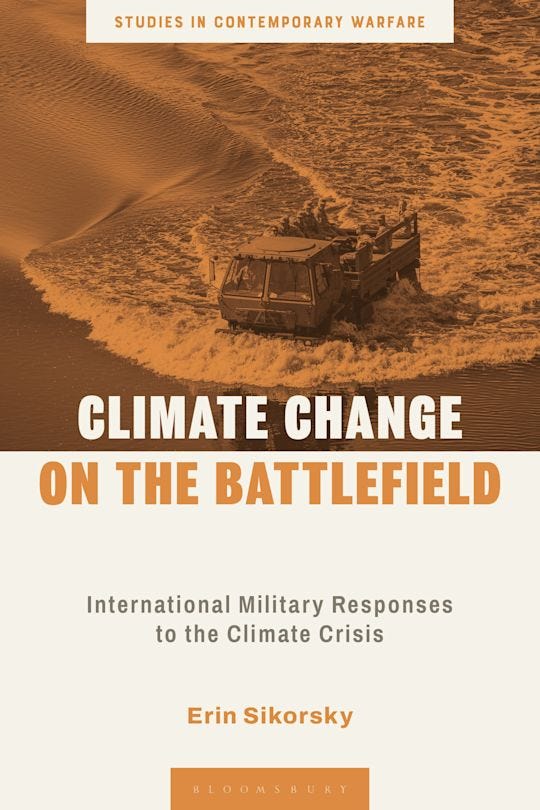Bloated & Broke: The UN at 80
The quick guide to "high level" week at the UN General Assembly.
Rounding out Virgo season….Happy birthday Todd, Peri, and Rachel!
Congrats to Amanda Bennett, winner of last week’s book drawing of Cynthia Miller-Idriss’s new book, Man UP! The book giveaway continues! (Look at me!) On the cusp of Climate Week, we’re excited to promote Erin Sikorsky’s book, Climate Change on the Battlefield: International Military Responses to the Climate Crisis.
Love this post by hitting 🖤 above —and, please, share with others. If you ❤️ the newsletter, please become a paid subscriber.
While the UN General Assembly has been underway since September 8, the so-called “high-level” talks kick off on Tuesday. That’s when world leaders descend upon New York’s East Side, deliver speeches, and meet for “bilats” (one-on-ones) on the “sidelines.”
And what a time to meet. The global situation is…err..fraught. Russia’s war of aggression on Ukraine drags on. Sudan is still at war. Israel continues to overwhelm Palestinians in Gaza—so much so that this week the UN declared its actions genocide. All this at a moment when the UN itself is in crisis: bloated, broke, and badly in need of reform. Here’s a short guide to next week’s UNGA 80. The Germans, who hold the rotating presidency of the General Assembly, have dubbed it “Better Together.” And who says the Germans don’t have a sense of humor? 🤭
What to Watch at UNGA 80
Trump’s address: Expect him to lecture the body to focus on its “founding principles” of peace and security. Someone should remind him that human rights were in there too. He is likely to defend Israel, praise cost-cutting, and boast of ending wars he hasn’t.
Women: According to UN Women, that there are just 29 UN member states led by women. There are 193 member states—so not a great record. Yes, this is 2025. As UN Women notes, “at the current rate, gender equality in the highest positions of power will not be reached for another 130 years.” 👀 We are watching one of them: Mexico’s new president, Claudia Sheinbaum, who will make her UNGA debut on September 23.
Men are speaking too: Ukraine’s Volodymyr Zelensky and Israel’s Benjamin Netanyahu will deliver high-profile speeches. The one to watch: Syria’s Ahmed al-Sharaa will debut on September 24. I’d also keep an eye on Serbia’s Aleksandar Vučić, who is dealing with student-led protests in his country—and, is generally, not a nice person.
A System in Crisis
As mentioned above, the UN is in crisis. Hey, it’s 80. 👵🏻 In March, UN Secretary-General António Guterres launched a reform process. He called for a 20 percent cut across the board—of both staff and programs. That’s largely the result of cash flow problems. The UN’s largest donor, the United States, is behind in its payments—about $1.5 billion to the regular budget and another $1.2 billion to peacekeeping, for a combined $2.7 billion.
But there is also what Suzanne Nossel notes is the UN’s “organizational challenges.” It does too much. There are 140 different entities that make up the system: 67 Secretariat departments and offices, 33 peacekeeping and political missions, 15 funds, 14 specialized agencies and about 4,000 mandates. It’s a sprawling bureaucracy that takes on “a dizzying array of tasks and projects, many of which are out-of-date, overlap, or fail to achieve much,” says Nossel.
The result: a body at once indispensable and unsustainable. I mean, if we didn’t have the UN, we’d have to invent it. Whatever you think about the UN, it matters—and saves lives.
Reform
With 193 member states, reforming the UN is no easy task. Reform is made exponentially harder with 5 veto-yielding Security Council members—two of whom, Russia and the US, are locked in a great power pissing match, making getting anything at the global body done impossible. Yes, there is talk about changing the veto, but since reforming the Security Council, including expanding it is not on the table for the foreseeable future, I’m skipping it.
Despite this institutional chaos, there are some are trying to chart a way forward. A year ago, I wrote about Barbados’ impressive prime minister, Mia Motley. She may be the head of a small island nation, but that’s not stopping her from forming a coalition to fight climate change. Yes, next week is also Climate Change week.
Project Starling —founded by Interruptrr gal pal Minh-Thu Pham—frames UN80 as a rare chance to modernize the UN and shift power to the Global South. We last talked to Minh-Thu when she was in Seville for the Development for Finance conference. She and her team have been busy looking at UN reform. (It’s a good conversation about UN financing).
In this paper, Project Starlingites argue that UN80 is an opportunity not only to modernize the UN, but bolster the voices and role of states in the Global South. It notes that UN80 will succeed only if all member states and civil society can shape the solutions and vision for today’s challenges.
Whether that vision emerges in the halls of the UN this week remains to be seen. But one thing is clear: the UN at 80 can’t just reflect, much less celebrate its past. It has to prove it still has a future. —Elmira
📚 Interrupt Your Bookshelf! 📚
As we gear up for Climate Week next week, Erin Sikorsky’s new book, Climate Change on the Battlefield: International Military Responses to the Climate Crisis arrives just at the right time. Erin looks at how climate change is reshaping modern military operations, and the role of international militaries in responding to the effects of the climate crisis.Enter the drawing to win a copy. Submissions close on Monday, September 22, 9:00am ET. And if you don’t win a copy, get it on Tertulia! A woman-run alternative to Amazon. Let’s support women.
Elsewhere in the World.....
On our radar...
On September 16, an independent UN commission published a report that found Israel has committed genocide against Palestinians in Gaza. What does that exactly mean? Rebecca Hamilton lays out how the commission reached its findings, what, if any, impact the report will have on Israel—or US policy and how it will impact South Africa’s case against Israel in the ICC. (Just Security)
Will the US continue to aid, abet, and arm genocide in Gaza? America’s leaders need to end the country’s continued support for the killing in Gaza, writes Katrina Vanden Heuvel. (The Nation)
Meanwhile, Israel has started its ground invasion of Gaza City, while the Palestinian death toll surpassed 65,000.
Listen: If you thought the Trump administration wouldn’t attack another Venezuelan boat in the Caribbean, think again! On Tuesday, the US sank another vessel, once again claiming it was carrying drugs, despite the lack of evidence. What do Venezuelans think about all this? Tibisay Zea reports that some are hoping this weakens the grip of their president, Nicolás Maduro. (The World)
People: this is definitely something to keep an eye on.
Oh to be king…. Donald Trump traveled to the United Kingdom this week, for an unprecedented second state visit, as he and the media are eager to remind us. No other US president has been extended such a courtesy. Moya Lothian-McLean notes that while Brits may not like Trump, they are attracted to his anti-immigrant nativism. (NYT) Gift article
“The pomp and ceremony bestowed to Trump is a particularly blatant example of what is… a widespread acceptance of the unacceptable,” writes Frances Ryan. She calls Trump’s second state visit to the UK, “realpolitik gaslighting.” (Guardian) Well said.
UN General Assembly
When the UN General Assembly convenes in New York next week, a number of countries, including France, Canada, Australia, and Belgium, will recognize Palestine as a state. And, even though Trump is pissed about Israel’s strike on Qatar, the US seems to be standing behind Benjamin Netanyahu. As the orange man himself would say, “Sad!”
On the topic of UNGA, specifically reform. Mariel Ferragamo and Diana Roy look at the Secretary-General’s plans—and what they can mean for the UN’s future. (CFR)
US
The Federal Reserve cut interest rates a quarter of a percentage point this week. It’s the first cut this year, after Trump has been going on about the need to lower interest rates. Has the Fed caved? Not necessarily. Stacey Vanek-Smith explains what impact this will have and what is likely to happen next. (Morning Edition)
Africa
Tensions between the US and South Africa are at an all time high, writes Michelle Gavin. But before you blame Trump, consider that post-apartheid South Africa’s foreign policy is rooted in ideology, history, and pressures that reflect its own domestic politics. (Foreign Affairs)
Asia
Nepal’s government fell just 36 hours after student protestors took to the streets. That’s part of a regional trend in South Asia, writes Vandana Menon. It follows in the footsteps of Sri Lanka and Bangladesh. (New Lines)
Among the crazy headlines from last week included the ICE raid on a Hyundai factory in Georgia, in which 300 South Koreans were rounded up and deported. It has caused tension among the otherwise close allies, writes Darcie Draudt-Véjares. (Carnegie Endowment)
File under: ARE YOU SERIOUS?! In Afghanistan, Daryna Antoniuk writes about how the Taliban has ordered the shutdown of fiber-optic internet cables across the country in order to “prevent immorality.” (The Record)
My maternal grandmother was barred from learning how to read and write, because her parents feared she’d used that skill to write love letters to boys. The woman I knew didn’t spend anytime thinking about men, so that was clearly flawed thinking.
Middle East
Ah, the good ole days…. This week marked five years since the signing of the Abraham Accords. The United Arab Emirates and Bahrain established relations with Israel, prompting talk about other Arab states, including Saudi Arabia, doing the same. Allison Minor and Sarah Zaaimi contributed to a briefing on how the accords transformed and been transformed. (The Atlantic Council)
Following Israel’s attack on Hamas targets in Doha last week, Gulf leaders can no longer rely on US protection. Qatar had been acting as a mediator between Israel and Hamas, at Washington’s behest. Now they’re rethinking their security, writes Cinzia Bianco. That presents Europe with an opportunity to engage and create its own pact with the Gulf. (ECFR)
Apropos of that attack, Saudi Arabia signed a defense pact with Pakistan this week. Maha el-Dahan and Saeed Shah have more. Along with a photo of Mohammad Bin Salman towering over a short Sharif. (Reuters)
Europe
Russian opposition leader Alexei Navaly’s widow, Yulia Navalnaya, says that test results show that her husband was poisoned. Laura Gozzi reports. (BBC)
So this is brow raising. While Trump was in Europe, a member of Germany’s far right Alternative for Germany (AfD ) party called on the White House. Pauline von Pezold, Chris Lunday, and Ferdinand Knapp have the details. (Politico)
And speaking of the AfD…. In local elections last weekend, the party made significant gains. Its Western charm offensive seems to be working, writes Lisa Haseldine. (The Spectator)
Under the Radar
It’s Climate Week next week! Xanthe Scharff argues that leading up to the BIG climate change conference, COP 30 in Brazil in November, the US “should recognize environmental defenders’ vital role in protecting democracy. (CSIS)
Opportunities
Book Club Alert! Lourdes Martin is the author behind the terrific Substack, Please Do Tell. She’s got a terrific book club called, “Parts Unread,” that we’ve attended before. Her next pick is Lynsey Addario’s It’s What I Do: A Photographer’s Life of Love and War. Discussion will be on Thursday, October 23. Get on this!
Tech Policy Press is taking applications for its 2026 Press Fellowship Program. Apply by Oct 15.
The Carnegie Endowment for International Peace is hiring for a Director of Government Affairs, Communications.
Editorial Team
Elmira Bayrasli - Editor-in-Chief





